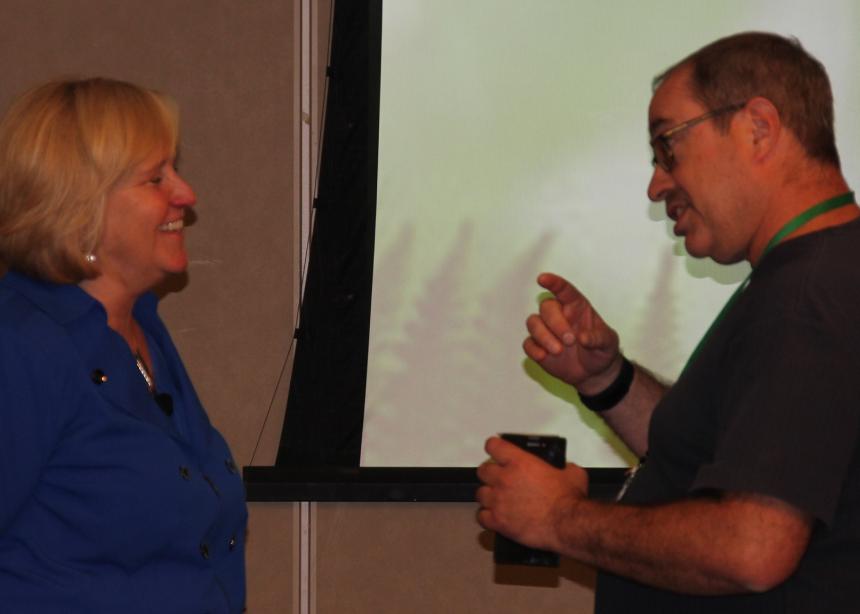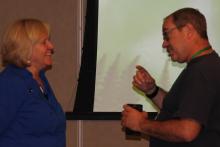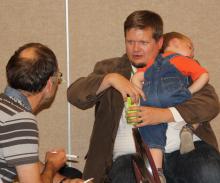“Wade in the water. Wade in the water, children. . . .”
Susan Beaumont had Mennonite Church Canada ministers sing the well-known spiritual at their “Leading in a season of change” conference preceding this year’s assembly on July 6, 2016. She invited them to stop, though, with the line, “God’s gonna trouble the water.”
“God is troubling the water during these times,” Beaumont said, telling the assembled ministers that they “are going around trying to calm the waters, while it is the troubled waters that will bring about the adaptations we need.”
Beaumont, a writer, consultant, coach and spiritual director based in Troy, Mich., and a former senior consultant with the Alban Institute, acknowledged that currently the church, both congregationally and denominationally, is experiencing a season of change. “Church life is ill-defined, and institutions are feeling increasingly irrelevant,” she said.
She called this time a “liminal season,” when a people or groups are “betwixt and between something that has ended, and a new situation has not fully begun.” She cited biblical examples such as Moses wandering in the desert, Jonah ruminating in the whale, and Joseph waiting in a pit and prison cell.
The time of being “betwixt and between,” is uncomfortable, Beaumont said, and it creates both threats and opportunities. While fear and anxiety may cause blockages to healthy change, such as poor behaviour, weary leaders and denial, she said that the discomfort can also lead to creative examining and reinventing patterns of thought and behaviour that ultimately strengthen communities.
In serving congregations well during uncertain times of same-sex marriage discussions and Future Directions possibilities, Beaumont encouraged pastors to “dance just beyond the edge of your authority,” while understanding the differences between technical and adaptive leadership.
Technical leadership is appropriate when problems and solutions are clear, she explained, and often is helpful in restoring order and maintaining the status quo.
Adaptive leadership, on the other hand, is required when problems are not easily defined, and learning and change in systems and behaviours are desired outcomes.
The pastoral leadership “dance” is done well when there is an appropriate balance between the two types of leadership, providing assurance and technical competence that lower anxieties in the congregation, she said. At the same time this leadership creates enough change to provoke levels of discomfort that are “hot” enough to invite adaptation but not so hot that “the system boils over.”
Beaumont asserted that, done well, pastoral leadership will produce some disequilibrium in the system, and not everyone will be happy with leaders for that. But she was clear in letting pastors know that effective adaptive leaders will always face resistance from a segment of their church. She noted that a principle of adaptive leadership is that it is “not primarily about managing change; it is about regulating the pace of loss. Leadership is about frustrating expectations at a rate that people can stand.”
Beaumont, not a Mennonite herself, commented that Mennonite pastors face a particular difficulty in that “the Anabaptist tradition is naturally suspicious. When we give [someone] authority, we think it will be abused, so we don’t give anyone authority,” she said. “Plus, add in the deep valuing of peace, and you add a layer of difficulty.”
Dan Graber, MC Alberta’s area church minister, resonated with this thought. “The biggest sin in the Mennonite church is to disturb the peace,” he said. “People are resentful that you have disturbed the peace.”
Acknowledging the difficult job of leadership did not seem to discourage the ministers in attendance.
Gordon Driedger, minister of Petitcodiac (N.B.) Mennonite Church, was encouraged by the presentation. “I am very hopeful,” he said. “Looking at a situation, and, instead of lamenting, we are looking for the opportunities that lie ahead and the best ways of unlocking them in a more imaginative way.”
Participant Elsie Rempel, who has lobbied for change in communion practices in Mennonite churches, resonated with the idea of understanding the resistance people exhibit as they try to cope with perceived losses in the face of changing ideas. “[Beaumont’s] analysis of living with change, and having strategies for change, worked on so many levels,” Rempel said.
“The topic was timely, trying to help equip us for changing times,” said Charleen Jongejan Harder, minister of Valleyview Mennonite Church in London, Ont. “The question is: how to take the tools home and apply them?”
The ministers’ conference concluded with Karen Martens Zimmerly, MC Canada’s denominational minister, and area church ministers offering anointing and prayer for ministers as they seek to faithfully lead the church during this season of change.
See more on Assembly 2016:
Taking down our harps (editorial)
Hope through lament and loss (overview)
Ready for God’s response? (focus on speaker Cindy Wallace)
Covenant and law: A matter of relationship (focus on speaker Safwat Marzouk)
The Mennonite Church Canada Assembly 2016 page has links to reports, videos, news sheets and more.





Add new comment
Canadian Mennonite invites comments and encourages constructive discussion about our content. Actual full names (first and last) are required. Comments are moderated and may be edited. They will not appear online until approved and will be posted during business hours. Some comments may be reproduced in print.